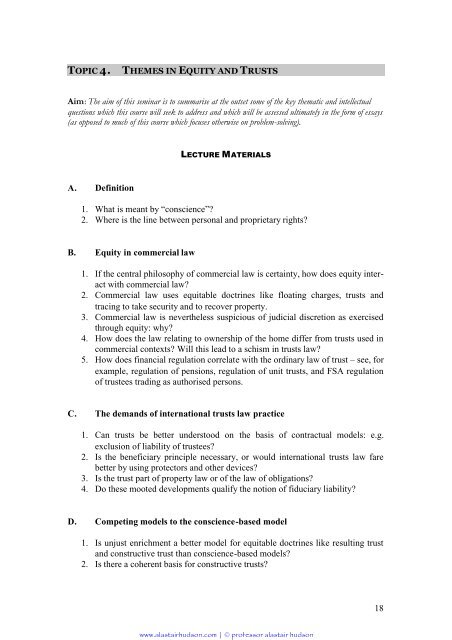Advanced Equity and Trusts Law - alastairhudson.com
Advanced Equity and Trusts Law - alastairhudson.com
Advanced Equity and Trusts Law - alastairhudson.com
Create successful ePaper yourself
Turn your PDF publications into a flip-book with our unique Google optimized e-Paper software.
TOPIC 4. THEMES IN EQUITY AND TRUSTS<br />
Aim: The aim of this seminar is to summarise at the outset some of the key thematic <strong>and</strong> intellectual<br />
questions which this course will seek to address <strong>and</strong> which will be assessed ultimately in the form of essays<br />
(as opposed to much of this course which focuses otherwise on problem-solving).<br />
A. Definition<br />
LECTURE MATERIALS<br />
1. What is meant by “conscience”?<br />
2. Where is the line between personal <strong>and</strong> proprietary rights?<br />
B. <strong>Equity</strong> in <strong>com</strong>mercial law<br />
1. If the central philosophy of <strong>com</strong>mercial law is certainty, how does equity interact<br />
with <strong>com</strong>mercial law?<br />
2. Commercial law uses equitable doctrines like floating charges, trusts <strong>and</strong><br />
tracing to take security <strong>and</strong> to recover property.<br />
3. Commercial law is nevertheless suspicious of judicial discretion as exercised<br />
through equity: why?<br />
4. How does the law relating to ownership of the home differ from trusts used in<br />
<strong>com</strong>mercial contexts? Will this lead to a schism in trusts law?<br />
5. How does financial regulation correlate with the ordinary law of trust – see, for<br />
example, regulation of pensions, regulation of unit trusts, <strong>and</strong> FSA regulation<br />
of trustees trading as authorised persons.<br />
C. The dem<strong>and</strong>s of international trusts law practice<br />
1. Can trusts be better understood on the basis of contractual models: e.g.<br />
exclusion of liability of trustees?<br />
2. Is the beneficiary principle necessary, or would international trusts law fare<br />
better by using protectors <strong>and</strong> other devices?<br />
3. Is the trust part of property law or of the law of obligations?<br />
4. Do these mooted developments qualify the notion of fiduciary liability?<br />
D. Competing models to the conscience-based model<br />
1. Is unjust enrichment a better model for equitable doctrines like resulting trust<br />
<strong>and</strong> constructive trust than conscience-based models?<br />
2. Is there a coherent basis for constructive trusts?<br />
www.<strong>alastairhudson</strong>.<strong>com</strong> | © professor alastair hudson<br />
18













